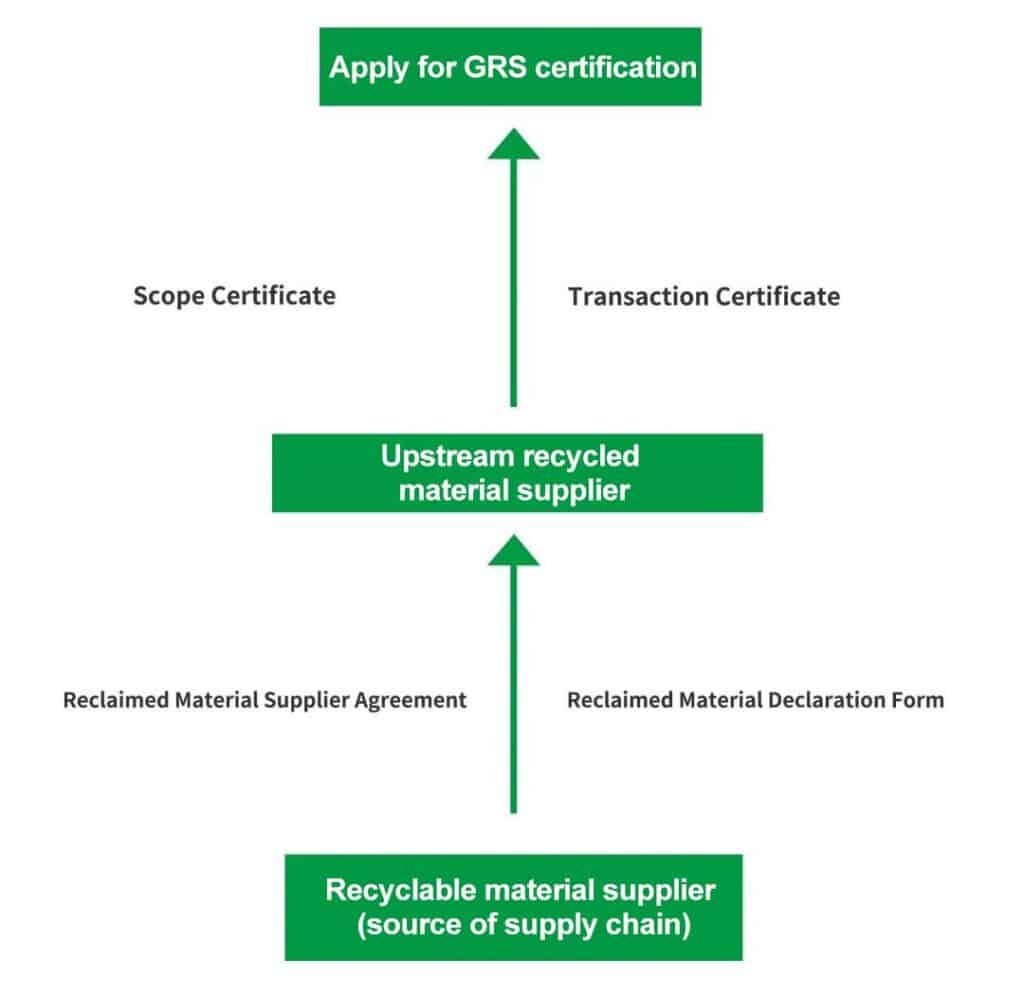Global Recycling Standard (GRS) is an international, voluntary product standard established by Control Union Certifications (CU) for recycled fibers. It sets requirements for third-party certification for recycled materials, supply chain management, social and environmental practices, and chemical restrictions.

What is GRS Certification?
The Global Recycling Standard (GRS) is a third-party certification system for recycled fibers established by Control Union Certifications (CU). It was first introduced by the Dutch Control Union in January 2008, with a focus on recycling post-consumer textile waste. In 2011, the copyright of the standard was transferred to the Textile Exchange, a global textile trade organization, which authorized third-party certification bodies to conduct GRS certification.
The GRS certification system covers five aspects: environmental protection, traceability, recycled content, social responsibility, and general principles. The certificate is valid for one year.
The goal of GRS is to provide a tool for consumers (brands and end-users) to make informed decisions to reduce the harmful impact of production on humans and the environment. It also aims to ensure that the materials in the final product are actually recycled and sustainable, promote innovation, and address quality issues of recycled materials.
What are the certification requirements?
1. Applicable products
The GRS certification applies to textile raw materials, accessories, finished products, and other products with 20% or more recycled content, such as plastic pellets, convenience bags, metals, sunglasses, cosmetic packaging, automotive interiors, automotive plastic parts, and non-woven products.
2. Recycled content ratio
The proportion of recycled materials in the product or packaging, calculated by weight. Only pre-consumer and post-consumer materials are considered as recycled content.
- Consumer-to-Producer Recycling: After being consumed, empty water bottles are collected and recycled to be reused in production. Maximize consumer-to-producer recycling!
- Producer-to-Consumer Recycling: Defective or scrap materials are recycled and reused in production, instead of being sent to the market. Maximize producer-to-consumer recycling!
3. Use of GRS logo & label and special statements
The production of products with a recycling ratio of ≥ 50%.
What are the mandatory conditions after application?
If a company wants to apply for GRS certification, its upstream suppliers of recycled raw materials should also have GRS certification. When applying for GRS certification, suppliers should provide Scope Certificate (SC) and Transaction Certificate (TC), and Reclaimed Material Supplier Agreement and Reclaimed Material Declaration Form for the reclaimed materials at the supply chain source when necessary.

What does the certification audit mainly focus on?
The GRS certification audit mainly focuses on four aspects: product quality system, social responsibility system, environmental management system, and chemical management system.
The requirements for recycled content and supply chain management focus on tracing the entire production process through documentation.
Social responsibility requirements are important and include child labor, discrimination against women, and overtime work. Companies that have successfully passed BSCI, SA8000, GSCP, and other social responsibility audits may be exempted from further evaluation by the certification body.
Environmental requirements are crucial and require participating companies to have a high level of environmental awareness. Regular testing of factory wastewater is necessary.
Chemical requirements mandate the use of MSDS and ensure that GRS products do not cause unnecessary harm to the environment or workers during production.
What is the certification process?
1. Application and contract.
After reviewing the application form, the certification body will provide a detailed budget in the contract. The applicant should confirm and sign the contract promptly upon receipt.
2. Registration.
The certification body will register the applicant and issue a registration number upon receiving the signed contract.
3. Payment.
The applicant must pay the audit fee after receiving the budget contract.
4. Audit.
After ensuring that the necessary system documents are in place, the certification body will arrange auditors to conduct an on-site audit and issue a formal report within two weeks after the audit.
5. Certificate issuance.
The certification body should issue the certificate within two weeks after receiving the formal report. If the audit does not meet the requirements, the certification body should take appropriate measures and correct all non-conformities within the specified time.
Certification fees and organizations
The audit fees for GRS certification vary depending on the type of company and range from 13,000 to 23,000 RMB. Certification bodies provide quotes based on the production process of the factory, with the highest price for the wet process.
Currently, the Textile Exchange authorizes third-party certification bodies to conduct GRS certification audits. The authorized certification bodies include CU, ITS, IDFL, TUV, ESTS, and others.



One Response
Insightful guide! The article clearly explains how GRS certification enhances transparency, recycled content, and ethical sourcing. Great to see brands striving for sustainability at every step!